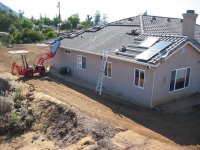Actually for me the solar panels should work out quite nicely. The way I sized them is this,
I looked at my electric utility bills for a couple of months and then sized the system so that it would supply 100% of my electric needs (4bedroom, 3bath, spa, AC, etc. i.e.;standard house). For me that is about 650kW/month. There are charts that will tell you how much solar radiation you can expect for where you live. Between the available sun power and my electric needs I needed a 5kW system.
As for paying for it,
The system I bought is actually a preconfigured for 2.5kW. So I bought two of them. They cost about $125000 per kit. The kits are complete with racks, panels, switches, inverters and wires. I drove out to pick them up in another state (AZ), so no shipping and no sales tax. Now I'm into it for $25000 plus some extra for misc wire and tools (who can't use extra tools?) . I'm also installing it myself so there is no labor costs. I'm not rich (right now) so I'm financing 80% of it. But after I finish the installation, the state of California will pay me $2.38/Watt or about $10710 (after efficiency losses). So now I'm financing $11440 for 30 years at fixed 6%. That comes out to be about $69/month. Right now I'm paying about $.09/kWh from the utility and use about 650kwh/month that is $58.5/month. BUT, BUT, BUT If utility rates go up that gap is closed very quickly. I'm betting that utility rates will increase and once it gets to $.11/kWh, I'm saving money.
So the bottom line is my system is costing me about $2860 upfront, plus $10/month. But I get a tax write off on the $11440 loan, and as rates go up my monthly goes down.
The system is not a battery back up system. Its called a grid-tie system. It feeds back through the main panel and will spin the meter backwards all day long, then at night it will turn around and spin forward again. At the end of the year my utility will look at the meter and If I use more than I generate, I will own them the difference, If I generate more than I make then they take it for free.
For us batteries are too much up keep, too many efficiency losses, and too much up front costs. Generators are the perfect solution for short term blackouts.
I hope I've answered the questions. Its probably not the best thing to do financially, but I'm not an accountant, I'm an engineer who likes to do things a little differently.

